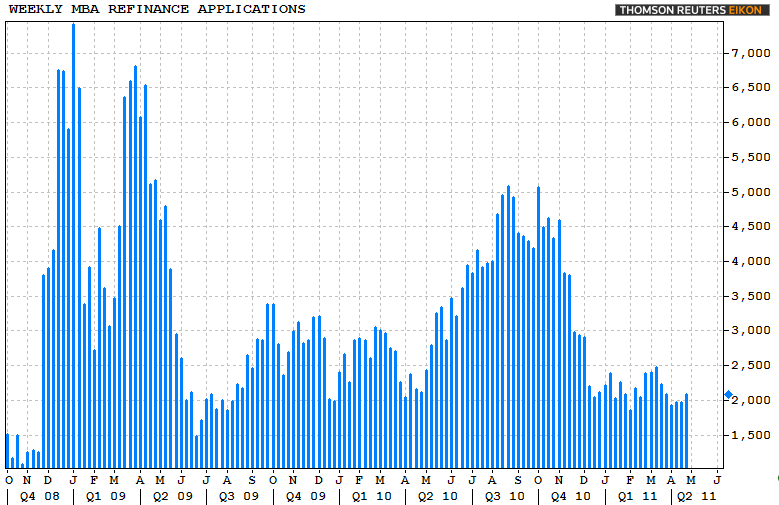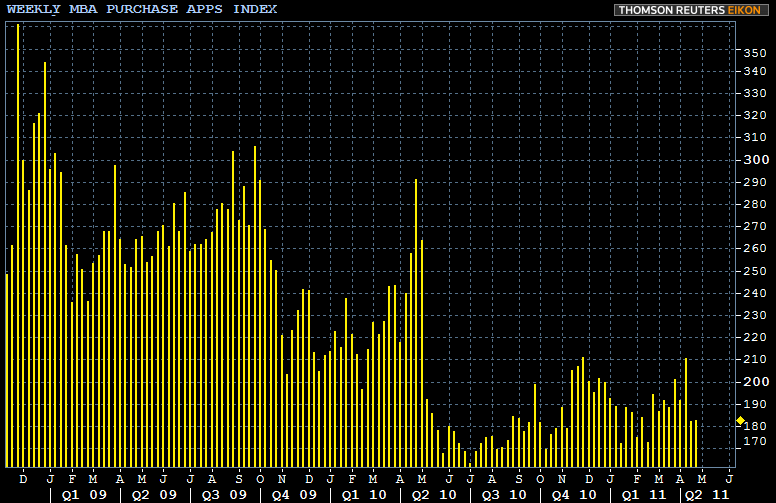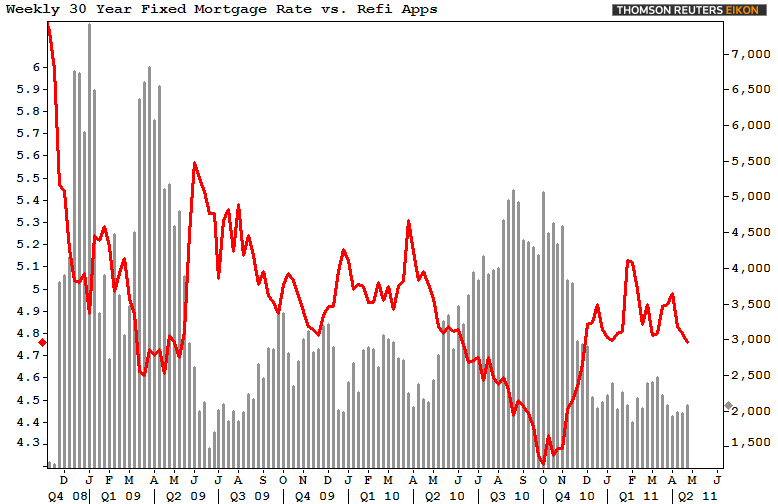Blog

Mortgage Demand Stagnates Despite Best Rates of Year
The Mortgage Bankers Association (MBA) today released its Weekly Mortgage Applications Survey for the weekrnending April 29, 2011.</p
The MBA’s loan application survey covers over 50% of all U.S. residentialrnmortgage loan applications taken by mortgage bankers, commercial banks, andrnthrifts. The data gives economists a snapshot view of consumer demand forrnmortgage loans. In a falling mortgage rate environment, a trend of increasingrnrefinance applications implies consumers are seeking out lower monthlyrnpayments. If consumers are able to reduce their monthly mortgage payment andrnincrease disposable income through refinancing, it can be a positive for therneconomy as a whole (may boost consumer spending. It also allows debtors to payrndown personal liabilities faster. A trend of declining purchase applicationsrnimplies home buyer demand is shrinking.</p
Excerpts from the Release…</p
The Market Composite Index, a measure of mortgage loan application volume,rnincreased 4.0 percent on a seasonally adjusted basis from one week earlier. Onrnan unadjusted basis, the Index increased 4.1 percent compared with the previousrnweek. </p
The Refinance Index increased 6.0 percent from the previous week. The fourrnweek moving average remained unchanged. The refinance share of mortgagernactivity increased to 62.7 percent of total applications from 61.6 percent thernprevious week. This is the highest refinance share of the month. </p
 </p
</p
The seasonally adjusted Purchase Index increased 0.3 percent from one weekrnearlier. The unadjusted Purchase Index increased 1.1 percent compared with thernprevious week and was 36.9 percent lower than the same week one year ago.rn The four week moving average is down 2.4 percent.</p
 </p
</p
The average contract interest rate for 30-year fixed-rate mortgages decreased for thernthird consecutive week to 4.76 percent from 4.80 percent, withrnpoints decreasing to 0.76 from 1.00 (including the origination fee) for 80rnpercent loan-to-value (LTV) ratio loans. This is the lowest 30-year fixedrncontract rate since December 3, 2010. The effective rate also decreased fromrnlast week.<br /<br /The average contract interest rate for 15-year fixed-rate mortgagesrndecreased to 3.96 percent from 4.03 percent, with pointsrndecreasing to 0.82 from 0.96 (including the origination fee) for 80 percent LTVrnloans. This is the lowest 15-year fixed contract rate since November 26, 2010.rnThe effective rate also decreased from last week.</p
 </p
</p
“Although demand for home loans moved up modestly last week as rates hit their best levels of the year, loan application activity continues to stagnate overall”, explains MND’s Managing Editor Adam Quinones. “We’ll need to see 30-year fixed mortgage rates approach 4.25% before a sizable uptick in refinancing is observed. On the buyer front, since early February we’ve heard reports from originators about a seasonal increase in purchase applications. The Purchase Index has however lost momentum following FHA’s mortgage insurance fee increase on April 18th.”</p
READ MORE: Fencesitters See Little Incentive to Refinance at Current Rates</p
READ MORE: Purchase Applications Deflate After FHA Fee Hike</p
READ MORE: Loan Officer Survey: Lending Regs No Looser
All Content Copyright © 2003 – 2009 Brown House Media, Inc. All Rights Reserved.nReproduction in any form without permission of MortgageNewsDaily.com is prohibited.
Latest Articles
By John Gittelsohn August 24, 2020, 4:00 AM PDT Some of the largest real estate investors are walking away from Read More...
Late-Stage Delinquencies are SurgingAug 21 2020, 11:59AM Like the report from Black Knight earlier today, the second quarter National Delinquency Survey from the Read More...
Published by the Federal Reserve Bank of San FranciscoIt was recently published by the Federal Reserve Bank of San Francisco, which is about as official as you can Read More...

Comments
Leave a Comment